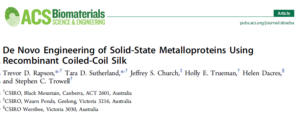De novo engineering of solid-state metalloproteins using recombinant coiled-coil silk
Our first paper describing design and engineering of a new protein-based material is now acepted in ACS Biomaterials Science and Engineering!
Abstract
In order to achieve the sophisticated chemistry required for life, nature uses metal containing proteins (metalloproteins). However, despite intensive research efforts, very few of these metalloproteins have been exploited for biotechnological applications. One major limiting factor is the poor stability of these proteins when they are removed from their cellular environment. To produce stable metalloproteins, we have developed an engineering strategy that uses structural proteins which can be fabricated into a number of different solid-state materials. Here we demonstrate that a recombinant silk protein (AmelF3 – Apis mellifera Fibroin 3) binds heme and other metal macrocycles in a manner reminiscent of naturally occurring metalloproteins, whereby an amino acid coordinates directly to the metal center. Our strategy affords design at four different levels; the metal center, the organic macrocycle, the protein scaffold and the material format structure. The solid-state metalloproteins produced remained functional when stored at room temperature for over one year.

